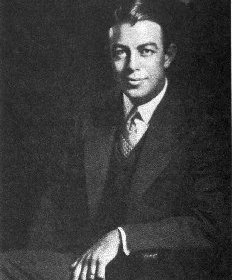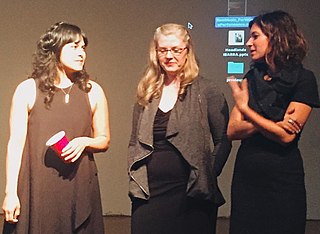
Benjamin Lee Whorf was an American linguist and fire prevention engineer best known for proposing the Sapir–Whorf hypothesis. He believed that the structures of different languages shape how their speakers perceive and conceptualize the world. Whorf saw this idea, named after him and his mentor Edward Sapir, as having implications similar to those of Einstein's principle of physical relativity. However, the concept originated from 19th-century philosophy and thinkers like Wilhelm von Humboldt and Wilhelm Wundt.
The idea of linguistic relativity, known also as the Whorf hypothesis, the Sapir–Whorf hypothesis, or Whorfianism, is a principle suggesting that the structure of a language influences its speakers' worldview or cognition, and thus individuals' languages determine or influence their perceptions of the world.
Psycholinguistics or psychology of language is the study of the interrelation between linguistic factors and psychological aspects. The discipline is mainly concerned with the mechanisms by which language is processed and represented in the mind and brain; that is, the psychological and neurobiological factors that enable humans to acquire, use, comprehend, and produce language.
Ethnolinguistics is an area of anthropological linguistics that studies the relationship between a language and the cultural behavior of the people who speak that language.
A linguistic universal is a pattern that occurs systematically across natural languages, potentially true for all of them. For example, All languages have nouns and verbs, or If a language is spoken, it has consonants and vowels. Research in this area of linguistics is closely tied to the study of linguistic typology, and intends to reveal generalizations across languages, likely tied to cognition, perception, or other abilities of the mind. The field originates from discussions influenced by Noam Chomsky's proposal of a Universal Grammar, but was largely pioneered by the linguist Joseph Greenberg, who derived a set of forty-five basic universals, mostly dealing with syntax, from a study of some thirty languages.

Eleanor Rosch is an American psychologist. She is a professor of psychology at the University of California, Berkeley, specializing in cognitive psychology and primarily known for her work on categorization, in particular her prototype theory, which has profoundly influenced the field of cognitive psychology.
Dedre Dariel Gentner is an American cognitive and developmental psychologist. She is the Alice Gabriel Twight Professor of Psychology at Northwestern University, and a leading researcher in the study of analogical reasoning.

Lera Boroditsky is a cognitive scientist and professor in the fields of language and cognition. She is one of the main contributors to the theory of linguistic relativity. She is a Searle Scholar, a McDonnell Scholar, recipient of a National Science Foundation Career award, and an American Psychological Association Distinguished Scientist. She is Professor of Cognitive Science at the University of California, San Diego. She previously served on the faculty at Massachusetts Institute of Technology and at Stanford.
Stephen C. Levinson FBA is a British social scientist, known for his studies of the relations between culture, language and cognition, and former scientific director of the Language and Cognition department at the Max Planck Institute for Psycholinguistics in Nijmegen, the Netherlands.
Cognitive anthropology is an approach within cultural anthropology and biological anthropology in which scholars seek to explain patterns of shared knowledge, cultural innovation, and transmission over time and space using the methods and theories of the cognitive sciences often through close collaboration with historians, ethnographers, archaeologists, linguists, musicologists, and other specialists engaged in the description and interpretation of cultural forms. Cognitive anthropology is concerned with what people from different groups know and how that implicit knowledge, in the sense of what they think subconsciously, changes the way people perceive and relate to the world around them.

Susan Goldin-Meadow is the Beardsley Ruml Distinguished Service Professor in the Departments of Psychology, Comparative Human Development, the college, and the Committee on Education at the University of Chicago. She is the principal investigator of a 10-year program project grant, funded by the National Institute of Child Health and Human Development, designed to explore the impact of environmental and biological variation on language growth. She is also a co-PI of the Spatial Intelligence and Learning Center (SILC), one of six Science of Learning Centers funded by the National Science Foundation to explore learning in an interdisciplinary framework with an eye toward theory and application. She is the founding editor of Language Learning and Development, the official journal of the Society for Language Development. She was President of the International Society for Gesture Studies from 2007–2012.
Melissa Bowerman was a leading researcher in the area of language acquisition. From 1982 to 2007, she was a senior research fellow at the Max Planck Institute for Psycholinguistics.
John A. Lucy is an American linguist and psychologist. His work primarily concerns the relations between language and cognition, especially the hypothesis of linguistic relativity. He is the William Benton Professor in the Department of Comparative Human Development and the Department of Psychology at the University of Chicago. Lucy has worked extensively with the Yucatec Maya language, specializing in the system of noun classification.
The question whether the use of language influences spatial cognition is closely related to theories of linguistic relativity—also known as the Sapir-Whorf hypothesis—which states that the structure of a language affects cognitive processes of the speaker. Debates about this topic are mainly focused on the extent to which language influences spatial cognition or if it does at all. Research also concerns differences between perspectives on spatial relations across cultures, what these imply, and the exploration of potentially partaking cognitive mechanisms.
Penelope Brown is an American anthropological linguist who has studied a number of aspects of cross-linguistic, sociolinguistic, and cross-cultural studies of language and cognition.
Roshan Cools is a Professor of Cognitive Neuropsychiatry at Radboud University Nijmegen. She is interested in the motivational and cognitive control of human behaviour and how it is impacted by neuromodulation. She was elected to the Royal Netherlands Academy of Arts and Sciences in 2018.

Olfactory language refers to language associated with the sense of smell. It involves the naming and categorisation of odours by humans according to each odour's perceived source or attributes. The study of olfactory language is part of the field of linguistics and is distinct from the study of semiochemical communication, which involves communication between organisms using chemical substances detected through olfaction.
Soonja Choi (Korean: 최순자) is a linguist from South Korea. She specializes in language acquisition, semantics, and the linguistics of Korean.
Aslı Özyürek is a linguist, cognitive scientist and psychologist. She is professor at the Center for Language Sciences and the Donders Institute for Brain, Cognition and Behaviour at Radboud University Nijmegen, and incoming Director of the Multimodal Language Department of the Max Planck Institute for Psycholinguistics.

Mark Dingemanse is a Dutch linguist and an Africanist. He is an associate professor in Language and Communication at the Centre for Language Studies of Radboud University Nijmegen. Dingemanse obtained a MA degree in African Languages and Cultures at Leiden University in 2006, and a PhD degree in arts in 2011 at Radboud University Nijmegen. He is also a Senior Investigator in the Multimodal Language and Cognition research group at the Nijmegen Max Planck Institute for Psycholinguistics. Dingemanse performed linguistic fieldwork in eastern Ghana and did comparative research on various languages. He is principal investigator of the research programme Elementary Particles of Conversation, on the small words in everyday language. The Royal Netherlands Academy of Arts and Sciences awarded Dingemans a Heineken Young Scientists Award in 2020.





